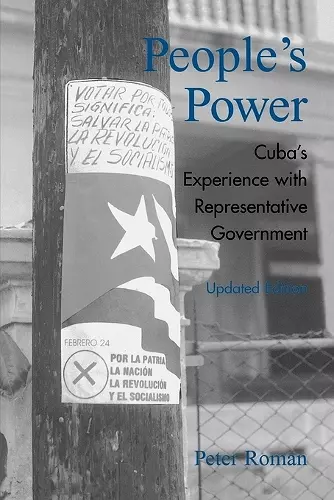People's Power
Cuba's Experience with Representative Government
Format:Paperback
Publisher:Bloomsbury Publishing PLC
Published:11th Nov '03
Currently unavailable, and unfortunately no date known when it will be back

People's Power is a theoretical, historical and analytical account of representative government that has emerged in Cuba since the 1970's. By combining original research and extensive interviews with citizens and officials, Peter Roman illustrates how the Cuban model was built on theoretical foundations derived from Rousseau, Marx, and Lenin, and the historical precedents of the 1871 Paris Commune, the 1905 and 1917 soviets, and the pre- and post-Stalin years of the Soviet Union. Cuba's contributions to this legacy—the Organs of People's Power—include unique approaches to the nomination and election of municipal assembly delegates and National Assembly deputies, to citizen input and participation, and to the role of the Communist Party. There is no other detailed study of the Cuban parliamentary system. Recorded eyewitness accounts the nominations sessions for municipal assembly delegates and the accountability sessions where citizens voice suggestions and complaints to their delegates, allow Cubans to speak for themselves. Reading this book is imperative for anyone interested in understanding the so often overlooked and misunderstood representative government that exists in Cuba today—as it has for decades.
Praise for the first edition: This is the first study to demarcate an important organ of Cuba's socialist government from its Soviet model. The study results in a reassessment of some entrenched presumptions about Cuba-that its government is totalitarianand non-responsive, and that all its allegedly representative bodies are rubber stamps, totally dominated by the Communist Party.... * The Washington Report On The Hemisphere *
Praise for the first edition: [Poeple's Power] reminds readers of a largely forgotten alternative approach to democracy, a (not fully worked out) approach that was embraced by many socialists for over a century but later was largely forgotten following the rejection of its completely bastardized application in the USSR. In this way this work also constitutes a contribution to the current debate on the nature of democracy under socialism, arguably the central issue in the post USSR debate on the nature of socialism... * Science & Society *
Praise for the first edition: This is a powerful, well-written, well-argued, and honest book. It makes a really eye-opening classroom text for courses on Cuba or socialism. Peter Roman should be congratulated upon a singular accomplishment..... * Monthly Review *
Peter Roman's book is a valuable study that helps us better understand the workings, successes, and shortcomings of the Cuban government's effort to promote democracy in that country. -- City University of New York, Carlos Sanabria, City University of New York
This well-researched and -written book . . . will come as a revelation to many readers. People's Power, based on years of field work and first-hand experience of Cuban elections and the workings of representative bodies, demonstrates that there is a functioning popular democratic political culture as the basis of the Cuban government. * Political Affairs *
Praise for the first edition:
This is the first study to demarcate an important organ of Cuba's socialist government from its Soviet model. The study results in a reassessment of some entrenched presumptions about Cuba-that its government is totalitarian and non-responsive, and that all its allegedly representative bodies are rubber stamps, totally dominated by the Communist Party.
Praise for the first edition: [Poeple's Power] reminds readers of a largely forgotten alternative approach to democracy, a (not fully worked out) approach that was embraced by many socialists for over a century but later was largely forgotten following the rejection of its completely bastardized application in the USSR. In this way this work also constitutes a contribution to the current debate on the nature of democracy under socialism, arguably the central issue in the post USSR debate on the nature of socialism. * Science & Society *
Praise for the first edition:
This is a powerful, well-written, well-argued, and honest book. It makes a really eye-opening classroom text for courses on Cuba or socialism. Peter Roman should be congratulated upon a singular accomplishment.
Deserves a place on the shelves of all serious students of Cuba and of comparative government. * The Bulletin Of Latin American Research *
Praise for the first edition:
This detailed study of the representative institutions of Cuban government provides considerable insight as to the sources of the resilience of Cuban socialism in the face of its well-known economic challenges. . . . Roman makes a strong case that local participation by ordinary citizens is common, lively, and given the lack of resources, reasonably effective. . . . Cuba's system should definitely be pondered by serious students of democracy, and Roman's informative book is a good place to start.
ISBN: 9780742525658
Dimensions: 229mm x 150mm x 20mm
Weight: 485g
312 pages
Revised edition